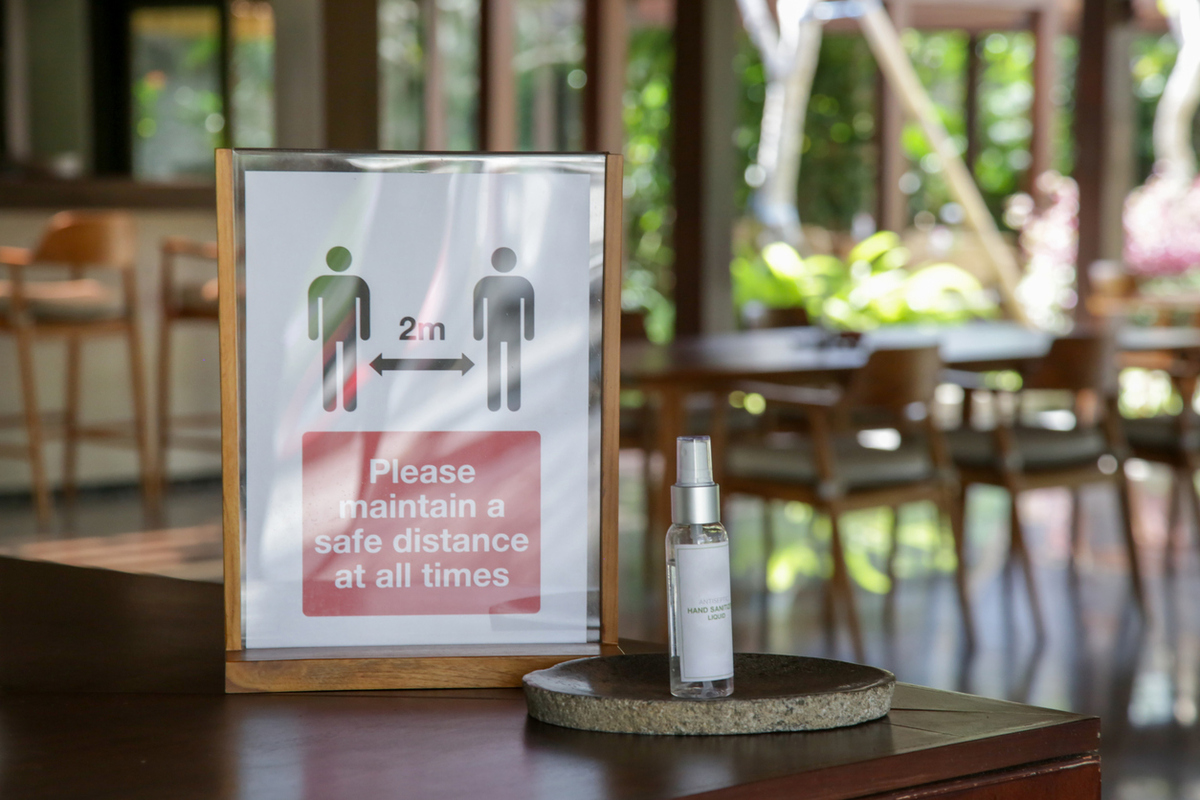Keeping your distance
Last updated: November 4, 2020

We all know that social distancing is an important part of slowing the spread of Covid-19. But how exactly does it help, and what are hotels doing to support distancing rules for their guests?
Covid-19 spreads through droplets
When a person with Covid-19 coughs, sneezes, or talks, virus-laden droplets leave their mouth. If those droplets land in the mouth or nose of someone nearby, they, too, can become infected. The principle of social distancing is pretty simple: the further away we all are from the person next to us, the harder it is for any potentially virus-filled droplets to reach us.
One metre, or two?
Different countries have taken different approaches to social distancing. Some countries have asked citizens to remain one metre apart while others, like Germany, have gone for 1.5 metres. In the UK, the Government asked for two metres of separation between members of different households (with a proviso of 1m if 2m is not possible).
Why the difference? Social distancing is imprecise, and research into the way Covid-19 spreads is still limited. While we know that keeping a distance from infected people lowers the risk of transmission, there are a number of factors that go into determining the exact distance necessary.
When someone coughs or sneezes, they’ll expel droplets in a range of sizes. Bigger droplets are heavier and will quickly fall to the ground, while smaller droplets will float further through the air, potentially reaching a nearby stranger. These smaller droplets, however, will carry smaller amounts of the virus, and it takes different amounts of virus to cause an infection in different people.
There’s also a difference between being inside and outside. Airflow is much greater outside, and droplets are carried away much more quickly. All these different factors make it hard to work out the exact distance needed to keep each individual safe. What does appear certain is that the further we stay apart the better: a recent study looking at Covid-19 and similar respiratory diseases found that at one metre apart infection risk is 13%, and drops to just 3% at beyond a metre’s distance.
Socially distancing indoors
When it comes to indoor spaces, such as hotels, it remains important to keep at least a metre apart – and more if possible. It’s particularly important to keep a distance in hotel restaurants, as these are spaces where talking and opening our mouths is all but obligatory, and restaurants and cafes should be keeping tables at least a metre apart. When not eating or drinking, it is now mandatory to wear a mask indoors.
More generally, hotels and guest accommodation are being asked by the UK Government to: Stagger guest arrival times to reduce queuing and crowding Use one-way routes and signs to reduce crowding in reception areas Schedule essential works such as cleaning and contractor visits to reduce opportunities for people to cross paths Ask guests to contact staff via phone messaging or apps, rather than talking in person.
Keeping your distance in limited space
Of course, there may be times where keeping your distance is a little harder. Certain hotel areas might present challenges, such as lifts or corridors. Where possible, it’s always best to avoid getting too close to anyone outside your group. If a lift arrives, says the CDC and it’s already busy, wait for an empty one to arrive or, if you’re well enough to do so, take the stairs and get some exercise at the same time.
If you do need to share space with a stranger, then UK Government and Canadian Government advice says to wear a mask and avoid talking, coughing or sneezing. Try not to touch any of the surfaces, and wash your hands as soon as you can. By maintaining distance from each other, everyone can work together to keep everyone safe.
Useful links Find up-to-date guidance on travel, safety, Covid-19 research and more.
RightRooms believes all information to be correct at time of going to press. As guidance, research and facts around Covid-19 are changing constantly, the information provided here is for general information only and does not constitute professional advice. Please check with venues, locations and attractions before travelling.
